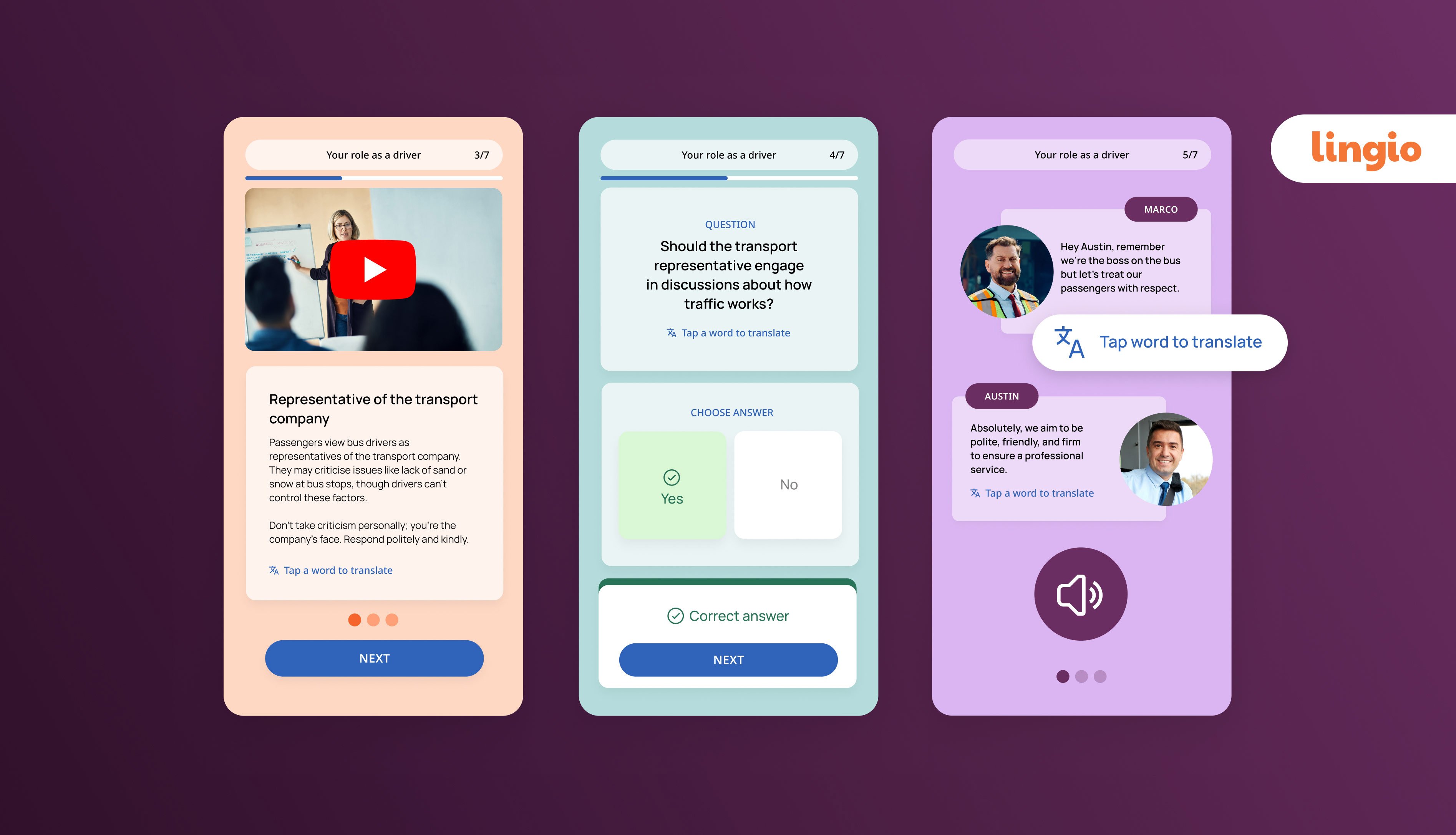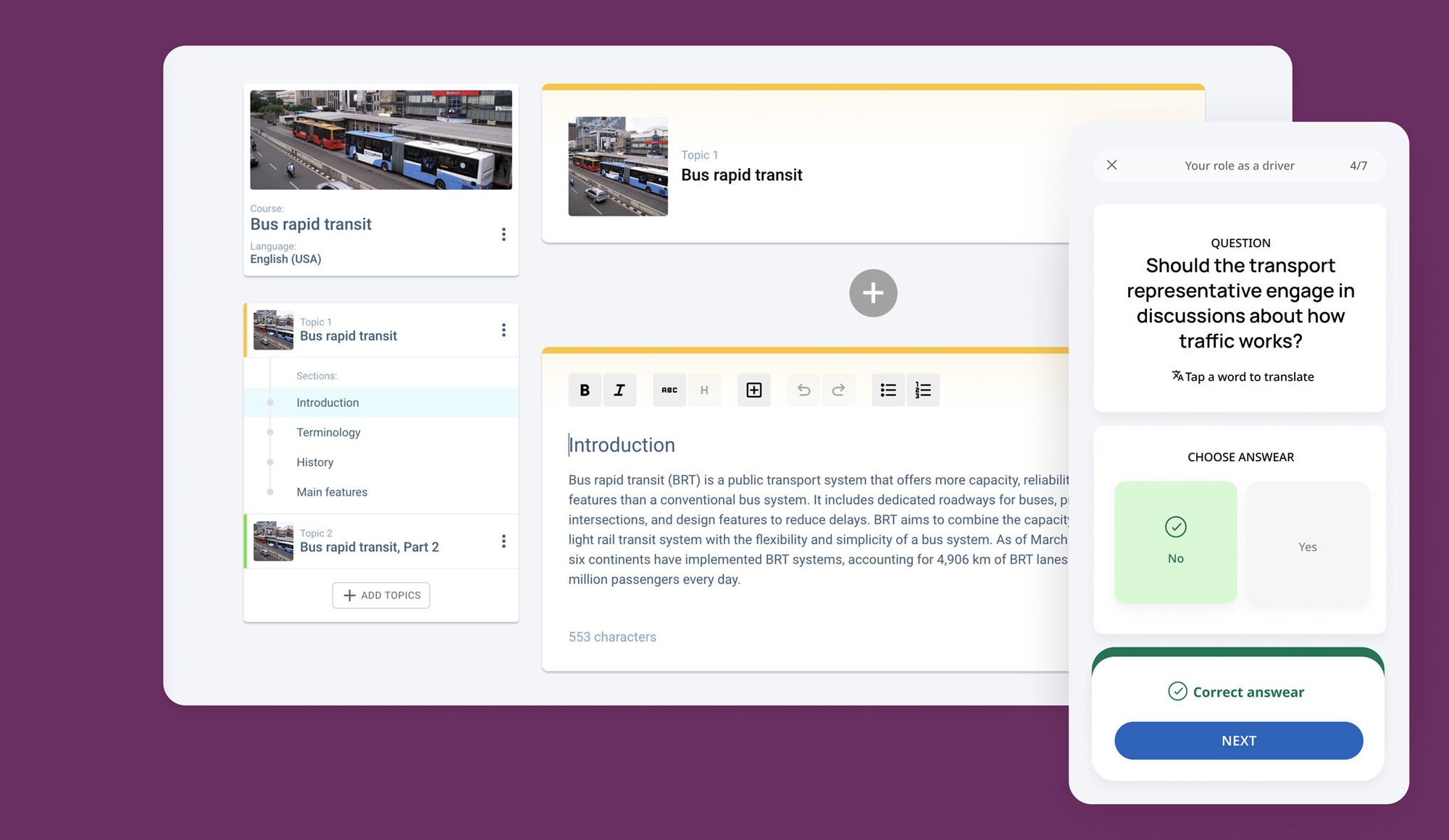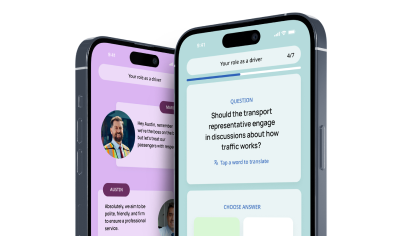Best hospitality LMS software tools to consider in 2024: A detailed roundup
From AI-powered course creation to powerful analytical features, these learning management systems for the hospitality industry are meticulously researched and curated to cater to a wide range of training needs. We delve into the key capabilities, pricing information, and platform ratings for each, ensuring you have the insights needed to make an informed decision for your organisation.
1. Lingio
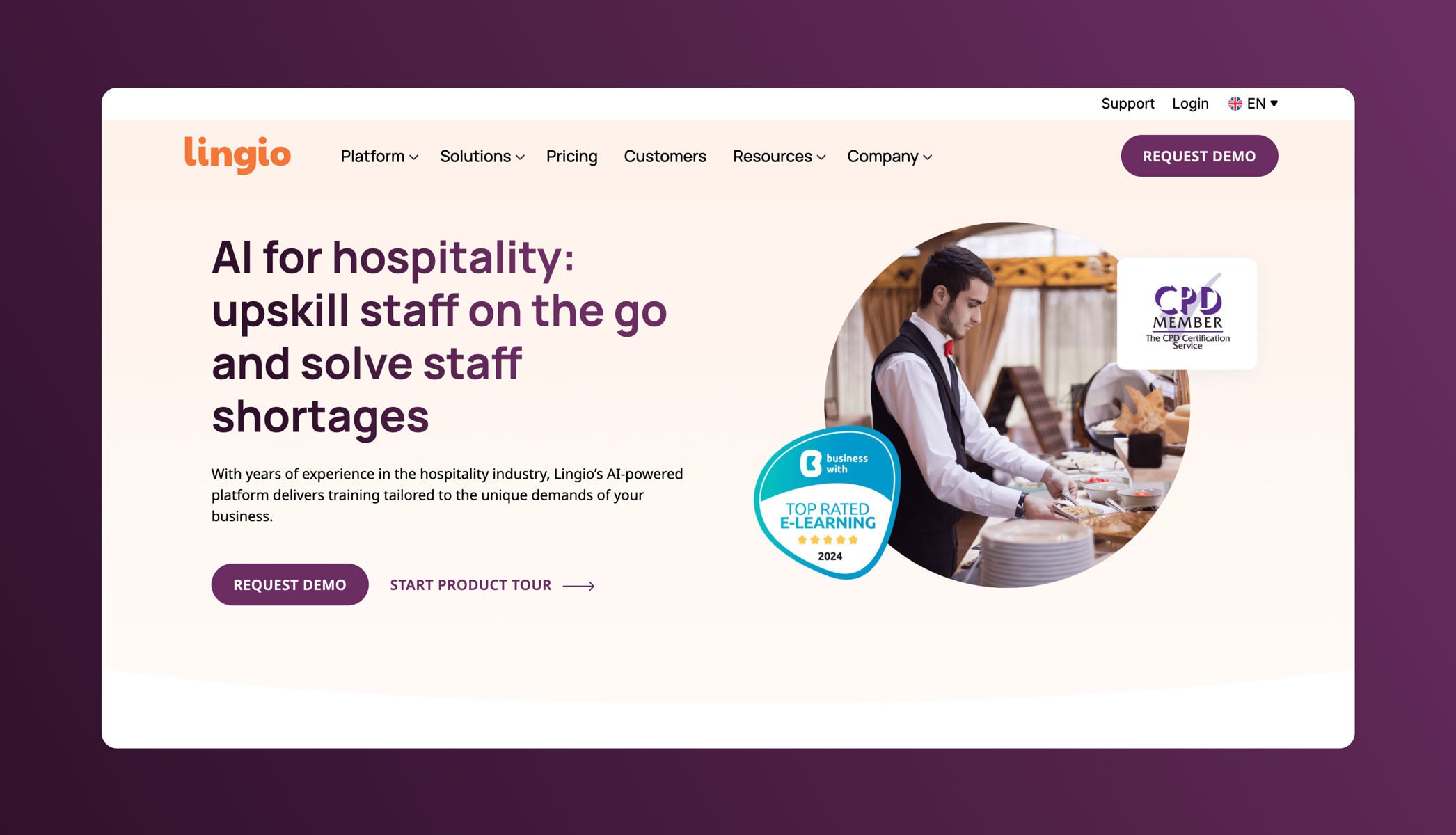
Discover Lingio, the LMS solution to fast-track frontline training tailored to the dynamic needs of frontline workers like those within the hospitality sector. By focusing on gamified, interactive mobile courses, Lingio not only aligns with the unique schedules of hospitality employees but also aims to elevate customer service standards across the industry.
Key capabilities of Lingio for hospitality training include:
- Rapid course development: Lingio’s AI course creation tool converts existing training materials into interactive, mobile-optimised training materials in a matter of seconds.
- Intuitive coaching portal: Features a user-friendly portal for administrators to distribute learning materials, monitor employee progress, and recognise achievements, fostering a culture of continuous improvement.
- Mobile-first learning: Provides a flexible learning environment through a learning app, integrating gamification to engage employees anytime, enhancing their skills within their busy schedules.
- Effortless course distribution: Facilitates the wide-reaching dissemination of educational content, accommodating organisations of varying sizes and ensuring consistent training access.
- Extensive pre-built course library: Offers a curated library of ready-made courses focused on key skills such as customer interaction, cybersecurity and workplace ethics, designed for immediate implementation or editable as per the need.
Lingio pricing:
- A feature-packed free trial is available to experience the platform's capabilities for your organisation.
- Paid plan information is available on a demo request.
TalentLMS
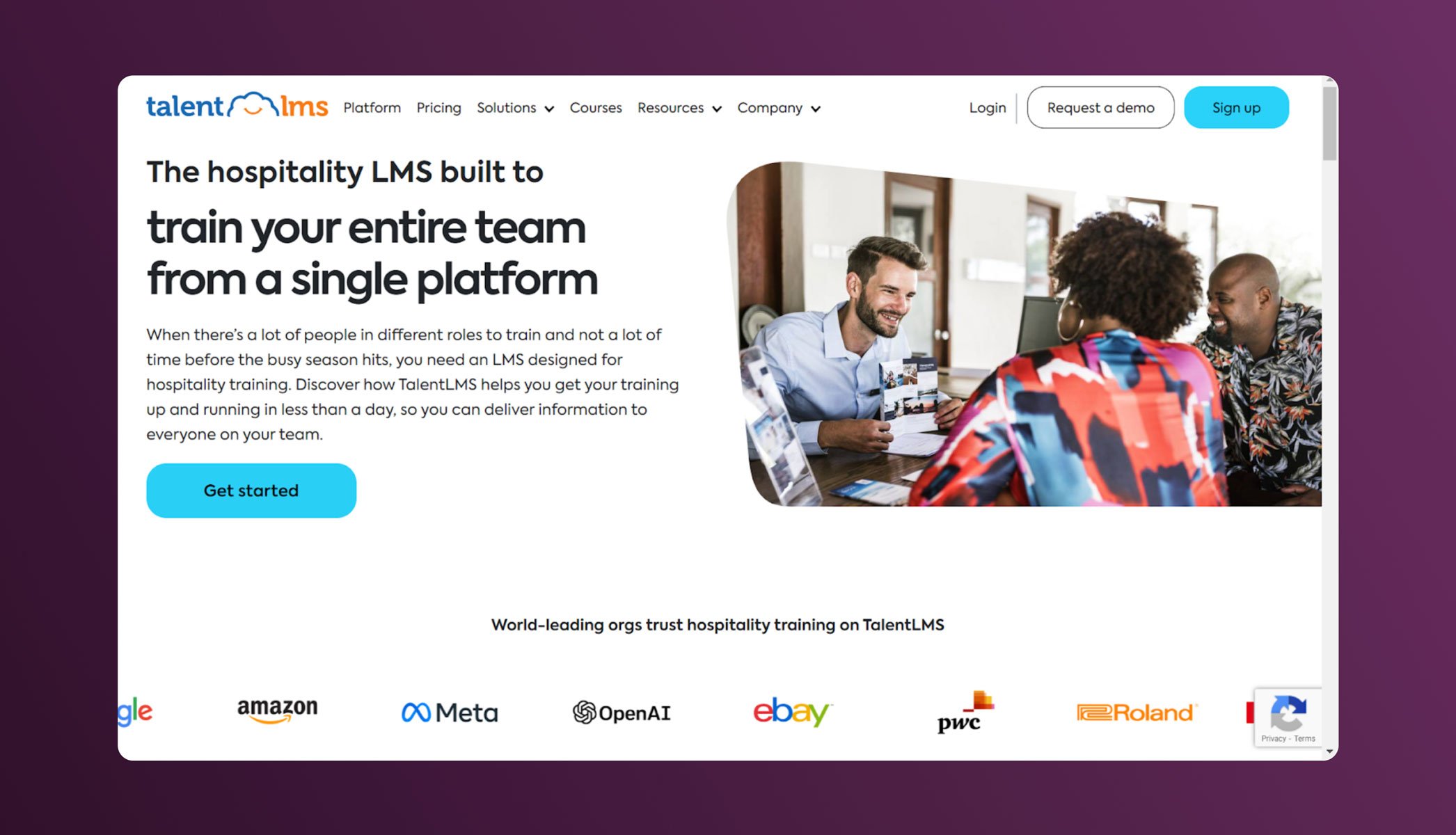
TalentLMS stands as a prime example of a cloud-based learning management system designed with the versatility to support and enhance online course creation and management across various industries, including hospitality. Powered by Epignosis, a frontrunner in learning technology, TalentLMS's mission is to make training accessible for all, boasting a global user base of over 70,000 teams.
Key capabilities of TalentLMS for hospitality training include:
- Automated management: Enables automatic course assignments, setting expiration dates, sequencing, and user deactivation, streamlining administrative tasks for new hires, seasonal training, and compliance checks.
- Role-specific training: Offers targeted learning solutions for all roles within the hospitality industry, from management to maintenance staff, ensuring relevant and effective training.
- Pre-designed courses: Provides a selection of ready-made courses specifically developed for the hospitality sector, allowing for faster training implementation.
TalentLMS ratings:
TalentLMS pricing:
- Freemium version is available. No credit card is required.
- Paid subscription plans start from $69/month when billed yearly.
3. Continu
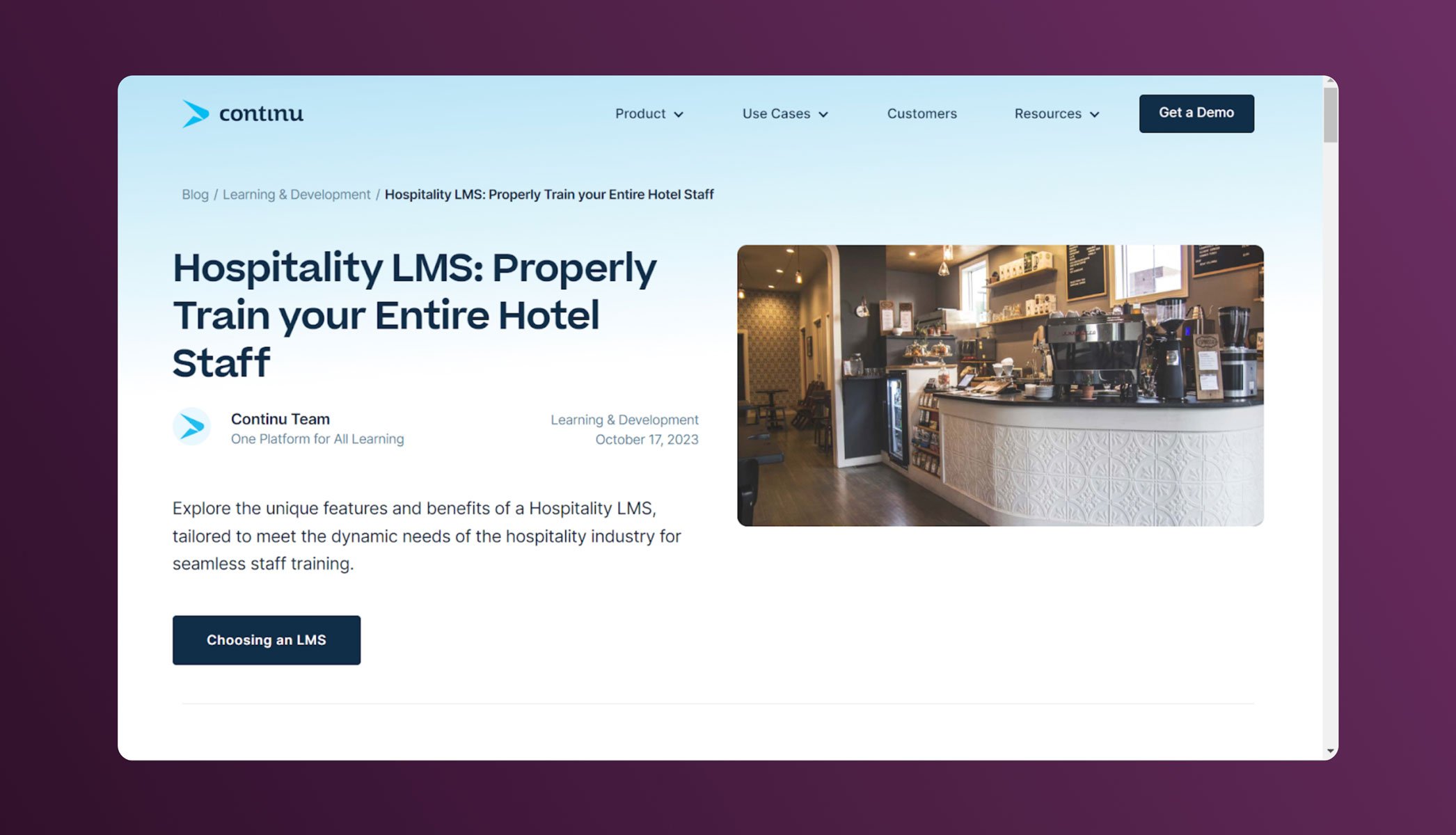
Continu is a contemporary learning platform that empowers organisations to create, manage, and enhance learning initiatives. Known for its ability to boost engagement rates, it's the chosen solution for leading companies like Slack, Instacart, and Upwork.
Key capabilities of Continu for hospitality training include:
- Deep integration: Seamlessly incorporates existing tools, allowing for the import of Google Drive files, Slack sharing, Zoom training sessions, and more, facilitating a unified learning ecosystem.
- Recognition badges: Motivates learners and drives engagement by awarding badges for learning milestones and achievements, fostering a culture of recognition and continuous improvement.
- Workshop management: Supports both virtual and in-person workshops, including attendance tracking, waitlist management, and the automation of workshop materials, simplifying the instructional process.
Continu ratings:
Continu pricing:
- Pricing information is available on request.
4. Tovuti LMS
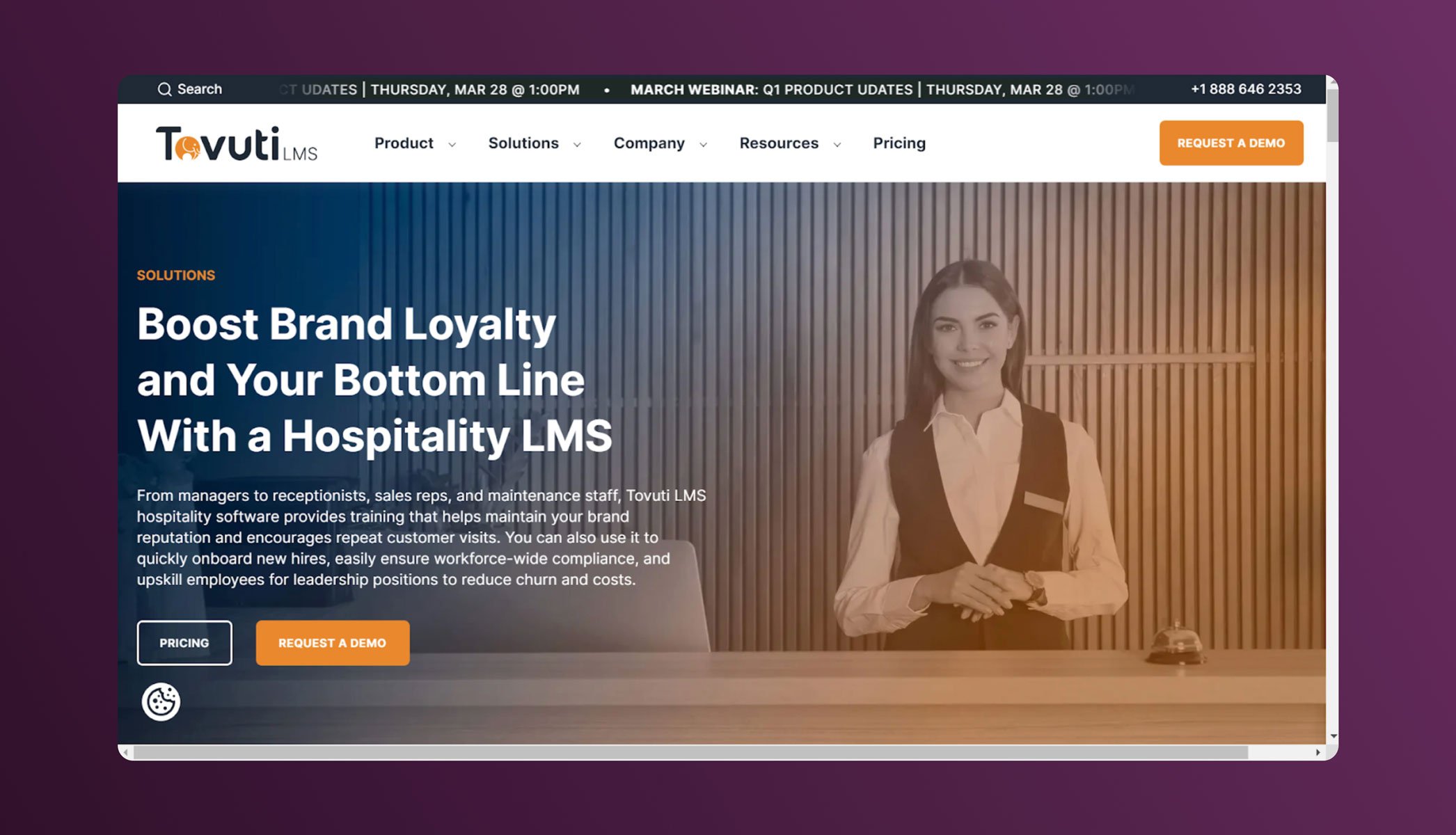
Tovuti LMS offers a streamlined solution for creating and delivering engaging learning experiences. Its all-in-one platform is designed to simplify the management of training programs, making education both enjoyable for learners and manageable for administrators.
Key capabilities of Tovuti LMS for hospitality training include:
- Multi-language support: Serves a global user base by providing content in over a dozen languages, with ongoing expansions to accommodate a diverse workforce.
- Fast implementation: Ensures readiness for use within a few hours, featuring same-day branding and white labelling for a swift training setup.
- Gamification elements: Features an extensive array of interactive content options, including games, scenarios, and animations, coupled with certifications and recognition systems, to boost learner engagement and retention.
Tovuti LMS ratings:
Tovuti LMS pricing:
- Pricing information is available on request.
5. Mykademy
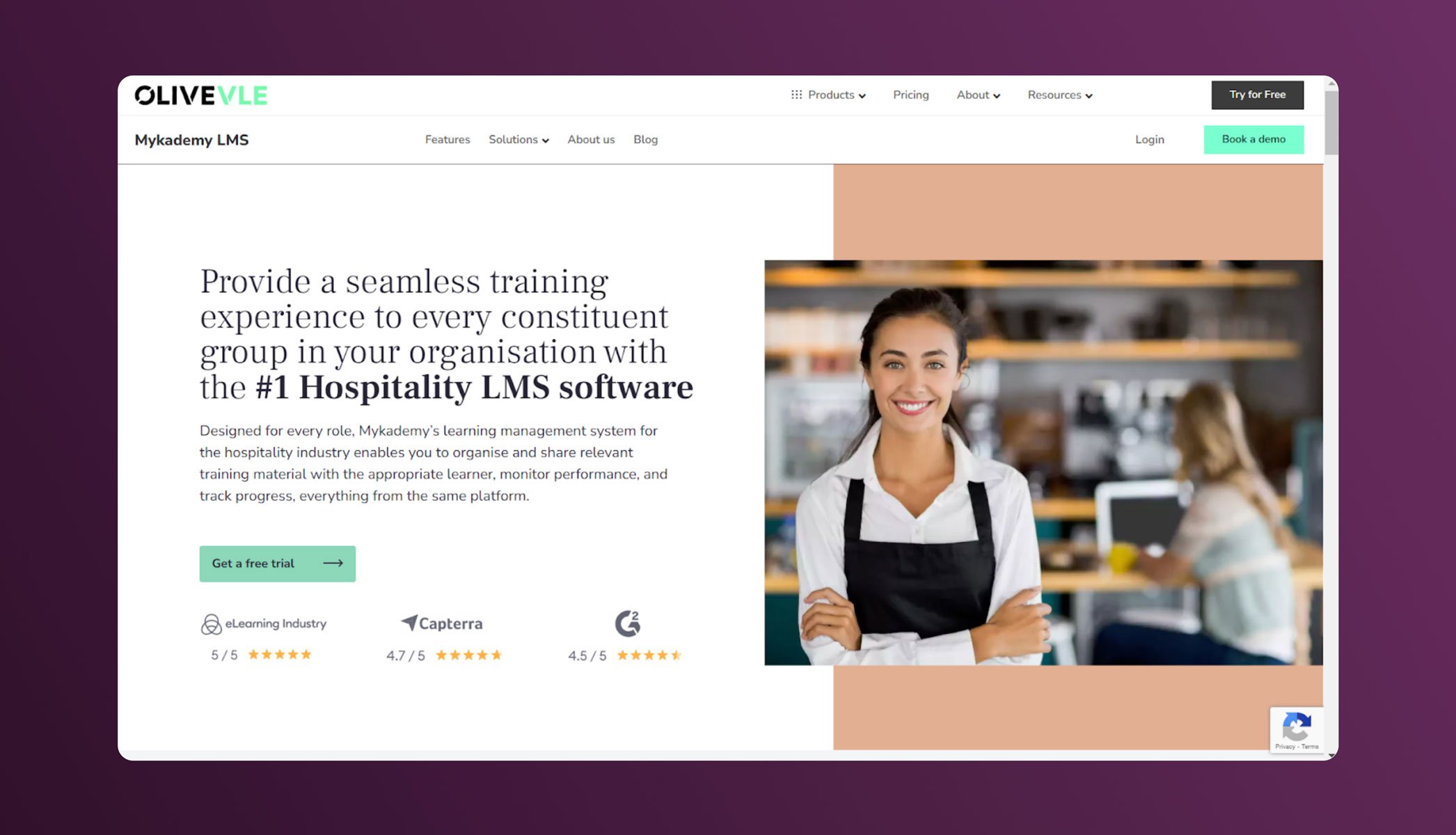
Mykademy presents a versatile LMS platform, offering a one-stop solution for businesses seeking efficient and comprehensive training and development tools. It caters to a broad spectrum of business needs, emphasising flexibility and accessibility in delivering educational content.
Key capabilities of Mykademy for hospitality training include:
- Live training: Enables the conduct of live training sessions, complementing pre-recorded classes to offer a dynamic and interactive learning environment.
- Extensive skill-based course library: Provides access to over 500 unique, ready-made courses designed by industry experts, aimed at upskilling teams to be work-ready and proficient in their fields.
- Learner progress notifications: Offers real-time notifications on learner progress, facilitating a thorough assessment of training impact and learner development.
Mykademy ratings:
Mykademy pricing:
- Free trial and paid pricing information is available on request.
6. Innform
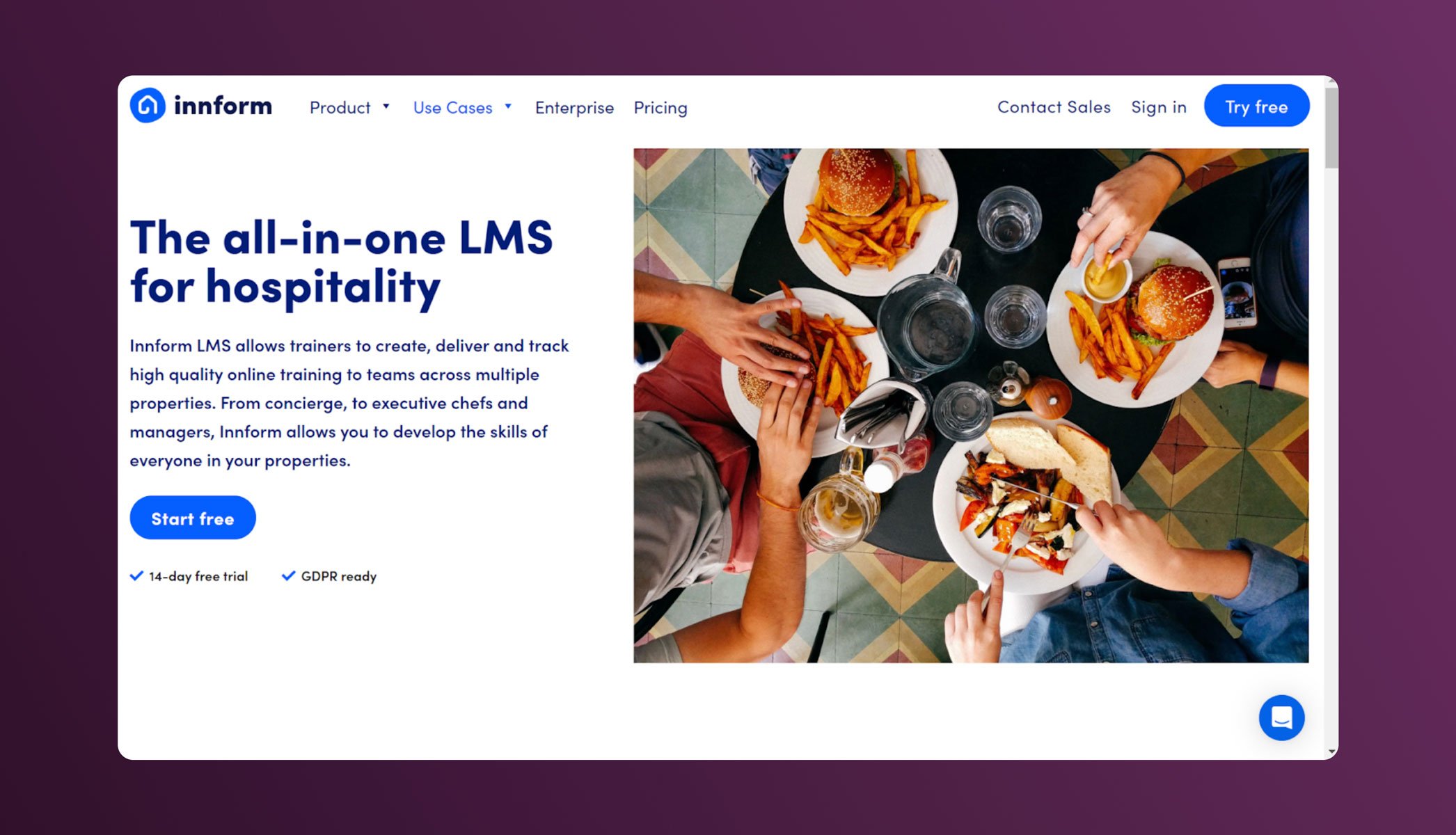
Innform offers a specialised online training platform designed for enterprises and their teams, focusing on creating and delivering top-tier online training globally. Emphasising learner-first features, Innform is GDPR and CCPA-compliant and has garnered trust from renowned hotel chains like Novotel.
Key capabilities of Innform for hospitality training include:
- Automated onboarding: Streamlines the introduction of new team members by automating the delivery of video courses, manuals, quizzes, and more, ensuring a smooth and efficient onboarding process.
- Certification: Enables the issuance of signed, custom certificates to learners upon completion of compliance courses, adding value to the educational journey.
- SCORM compatibility: Facilitates the upload and assignment of existing SCORM courses and quizzes, allowing for quick and easy distribution of learning materials.
Innform ratings:
Innform pricing:
- 14-day free trial of the Pro plan is available. No credit card is required.
- Paid subscription plans start from $1.4/person/month when billed annually.
7. SeekLMS
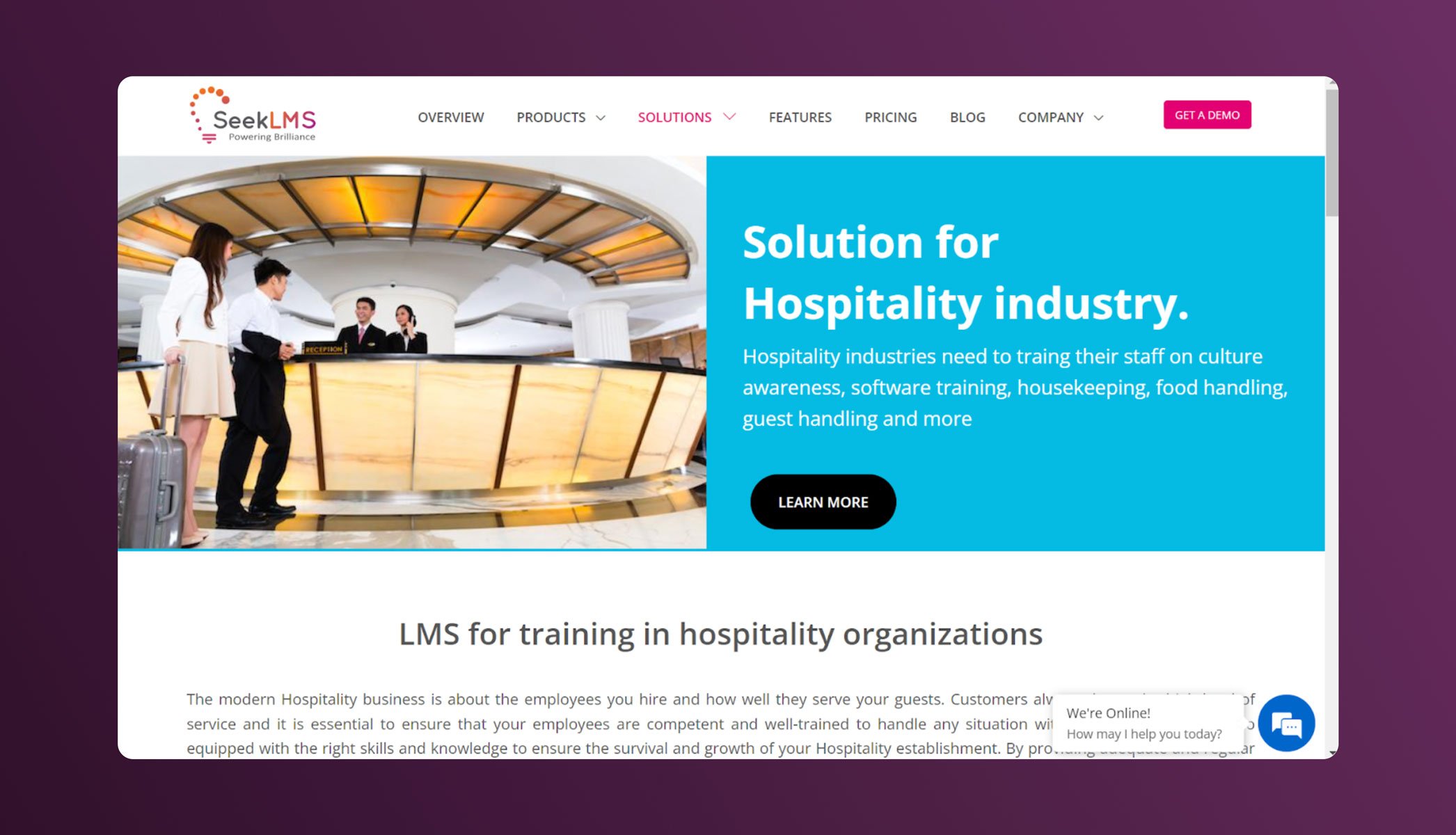
SeekLMS is a cloud-based LMS designed for versatility and ease of use, catering to both organisations managing employee training and online academies. With its built-in authoring tool, SeekLMS simplifies the creation and delivery of engaging courses, offering comprehensive solutions to streamline learning processes end-to-end.
Key capabilities of SeekLMS for hospitality training include:
- Flexible delivery modes: Supports a variety of course delivery options, including self-study, web conference, on-campus, and blended learning, allowing for customised learning experiences tailored to course requirements and learner preferences.
- Surveys and ratings: Enables the collection of learner feedback through automated or on-demand surveys and configures pop-ups for gathering course ratings, utilising star or NPS formats to gauge learner satisfaction and course impact.
- Discussion forums: Incorporates features like discussion forums to foster a collaborative learning environment, encouraging the exchange of ideas and promoting a vibrant learning culture.
SeekLMS ratings:
- G2 rating: 4.8/5 (5 ratings)
- Capterra rating: Not listed yet.
SeekLMS pricing:
- Free trial and paid pricing information is available on request.
8. Docebo
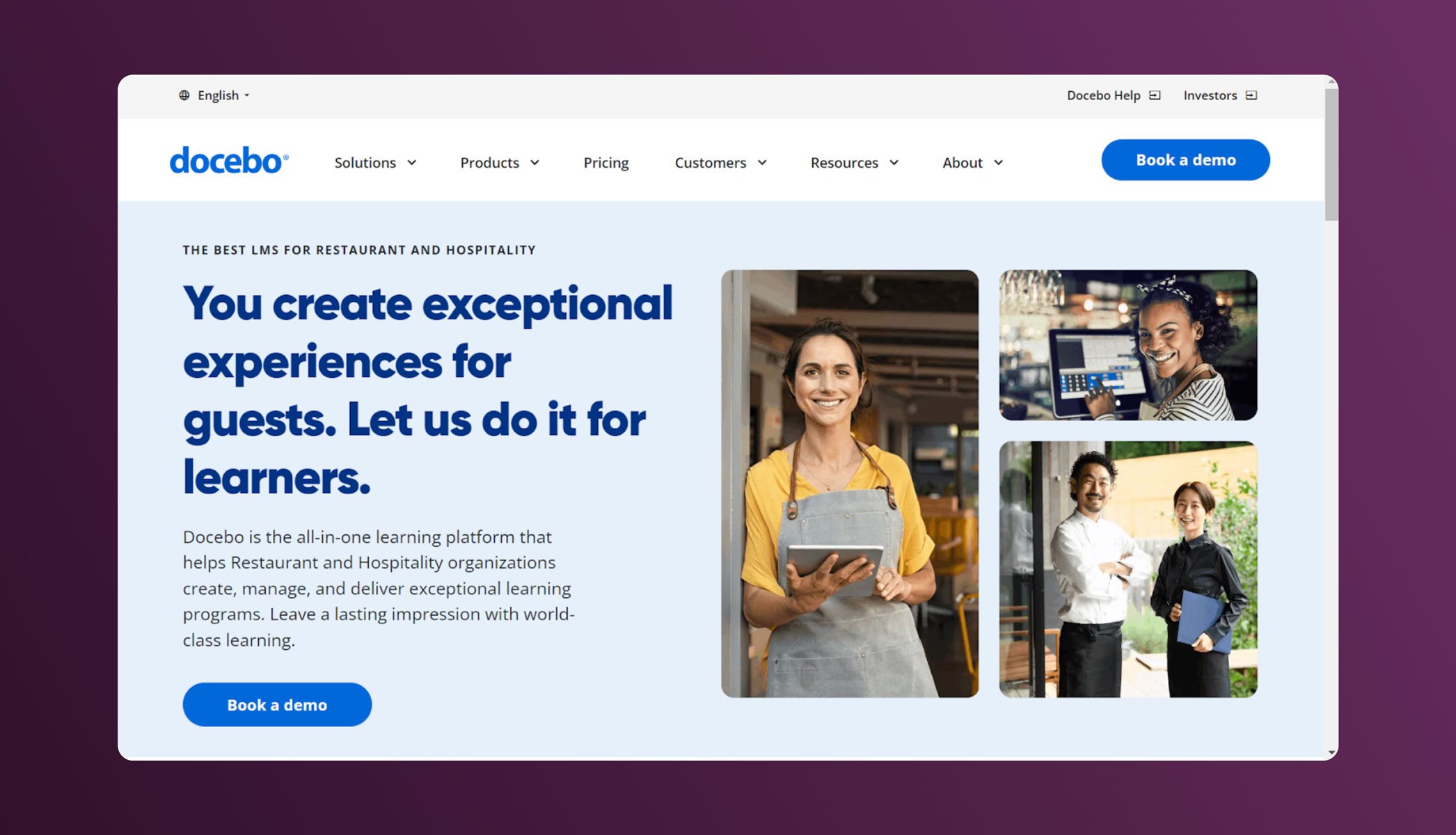
Docebo's learning platform is designed to enhance engagement, productivity, and connectivity among customers, partners, and employees. Serving over 3,700 companies globally, Docebo offers a multi-product learning suite powered by advanced AI, equipping enterprises to address diverse learning challenges and foster a robust learning culture within their organisations.
Key capabilities of Docebo for hospitality training include:
- Accelerated content creation and translation: Utilises generative AI to speed up content creation and translation, centralising knowledge management and content governance.
- Compliance management: Simplifies content organisation, version control, and delivery with standardised processes, ensuring adherence to regulations like OSHA and HACCP through automated compliance, recertification, and reporting.
- Extensive content library: Provides access to over 20,000 pieces of premium content, including diversity, equity, and inclusion programs and food safety training.
Docebo ratings:
Docebo pricing:
- Pricing information is available on request.
9. Absorb LMS
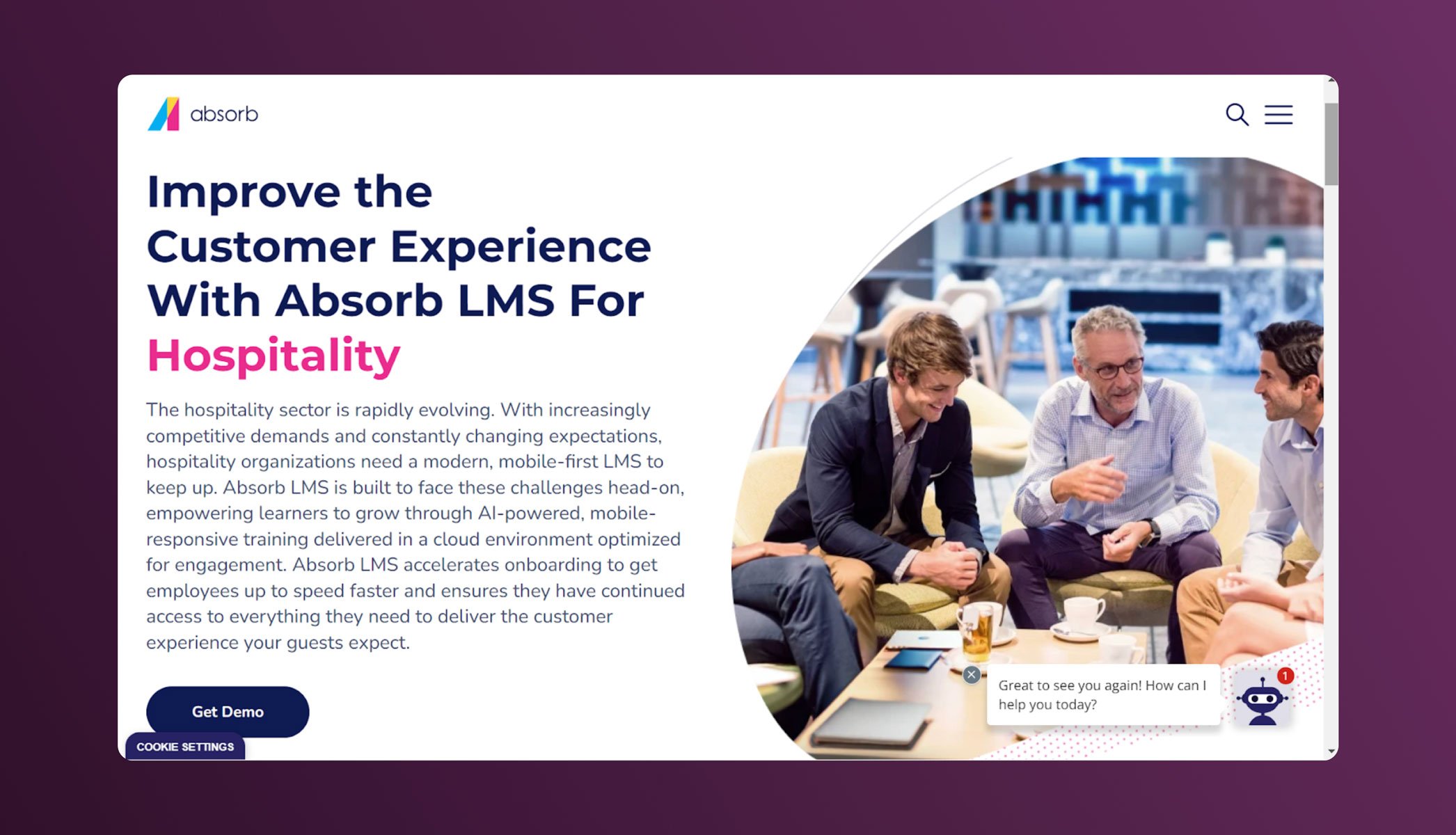
Absorb LMS is an AI-powered learning management system designed to offer an intuitive and engaging experience for both learners and administrators. It focuses on delivering meaningful learning experiences aimed at achieving tangible training goals.
Key capabilities of Absorb LMS for hospitality training include:
- Intelligent content creation: Leverages Absorb Create with generative AI to reduce the time required for course creation significantly. This tool enables both experienced course creators and subject matter experts to efficiently research, structure, and design courses.
- Intelligent recommendations: Utilises advanced AI to analyse learner data and suggest new content that aligns with their interests alongside popular courses.
- Customisable learner portals: Supports the creation of unique learner portals tailored to specific roles, locations, languages, and more, thanks to its multi-tenant architecture, ensuring a personalised learning environment for every user.
Absorb LMS ratings:
Absorb LMS pricing:
- Pricing information is available on request.
10. Litmos
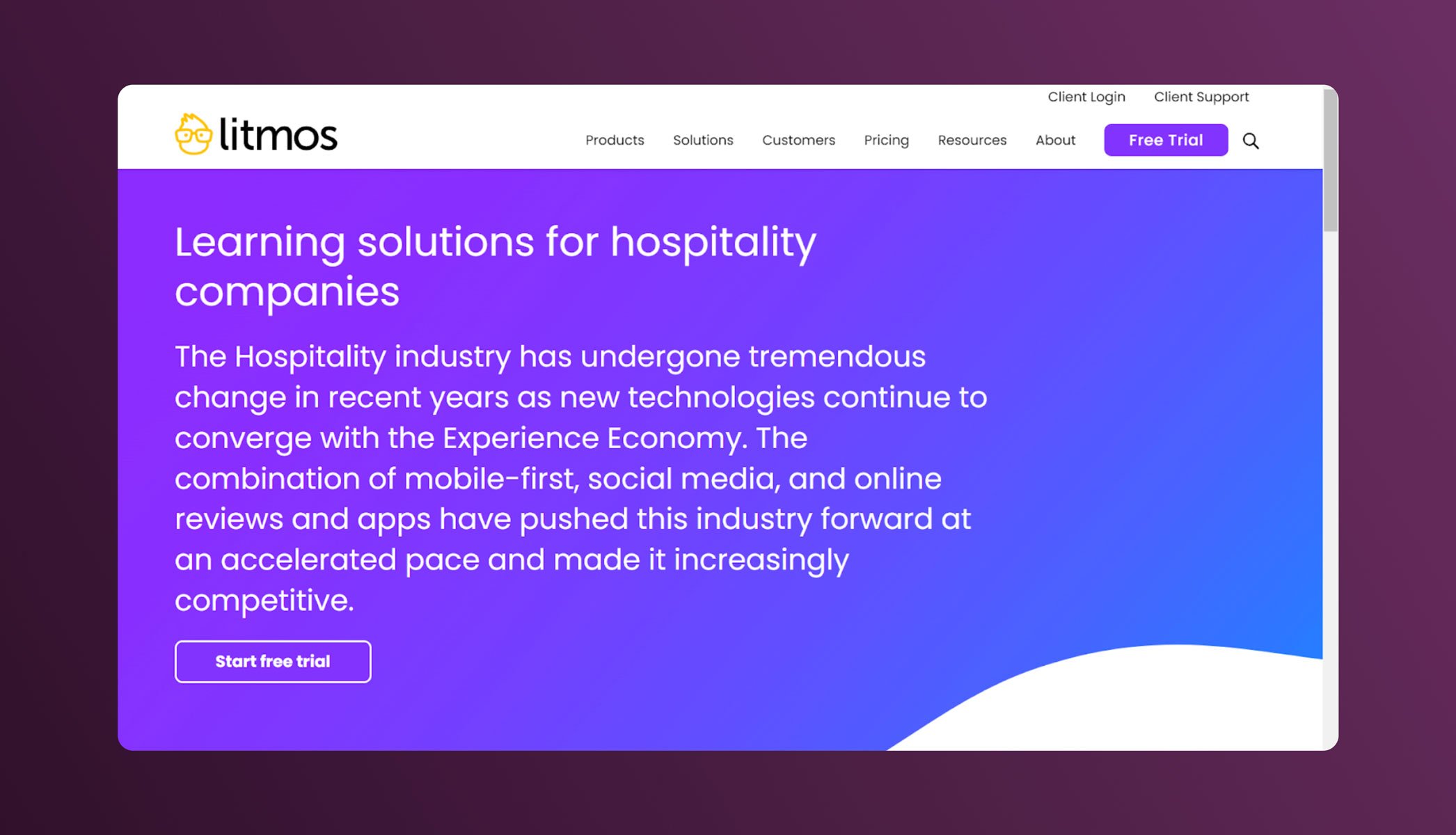
Litmos presents a solution tailored for corporate training, offering a learning platform combined with extensive content libraries. Utilised by over 30 million users across 150 countries and available in 35 languages, Litmos is a globally recognised platform for its ease of use and comprehensive training solutions.
Key capabilities of Litmos for hospitality training include:
- Global accessibility: Ensures 24/7 access to training materials, both online and offline, and accommodates learners with disabilities. It supports over 35 languages, allowing users to engage in their language of preference, thus removing barriers to learning.
- Hospitality-focused courses: Provides a wealth of content specifically designed for the hospitality industry, including short, video-based courses on customer service, communication and social skills, and more developed by subject matter experts.
- Efficient tracking and reporting: Offers powerful tools for tracking and measuring the effectiveness of onboarding and other training programs, crucial for managing the high turnover typically seen in the hospitality industry and ensuring continuous learning progress.
Litmos ratings:
Litmos pricing:
- 14-day free trial plan is available.
- Paid pricing information is available on request.
11. AcademyOcean
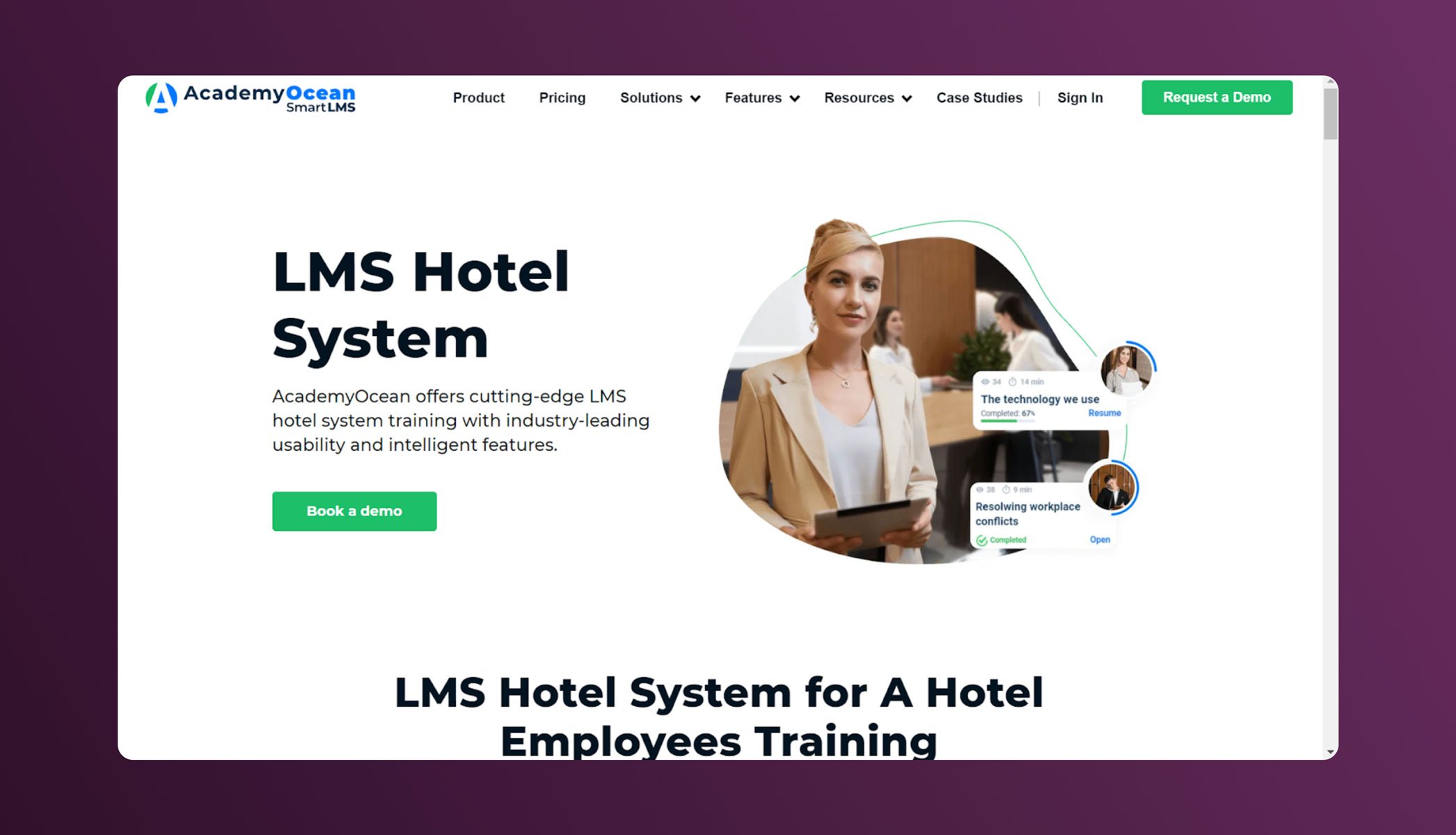
AcademyOcean is a dynamic e-learning platform built to simplify the creation and distribution of corporate training courses. It positions itself as a smart LMS solution, aiming to enhance business training with ease and efficiency.
Key capabilities of AcademyOcean for hospitality training include:
- Unlimited cloud portals: Allows the creation of a large number of educational environments or portals, which can be configured as invite-only or public to suit various audience needs.
- Team creation and course assignment: Enables grouping learners into department-specific teams for relevant course assignments. Automates progress through their Smart Teams feature, streamlining course completion and team transitions.
AcademyOcean ratings:
AcademyOcean pricing:
- Paid subscription plans start from $22/month when billed annually, covering 1000 participant spots.
12. EdApp
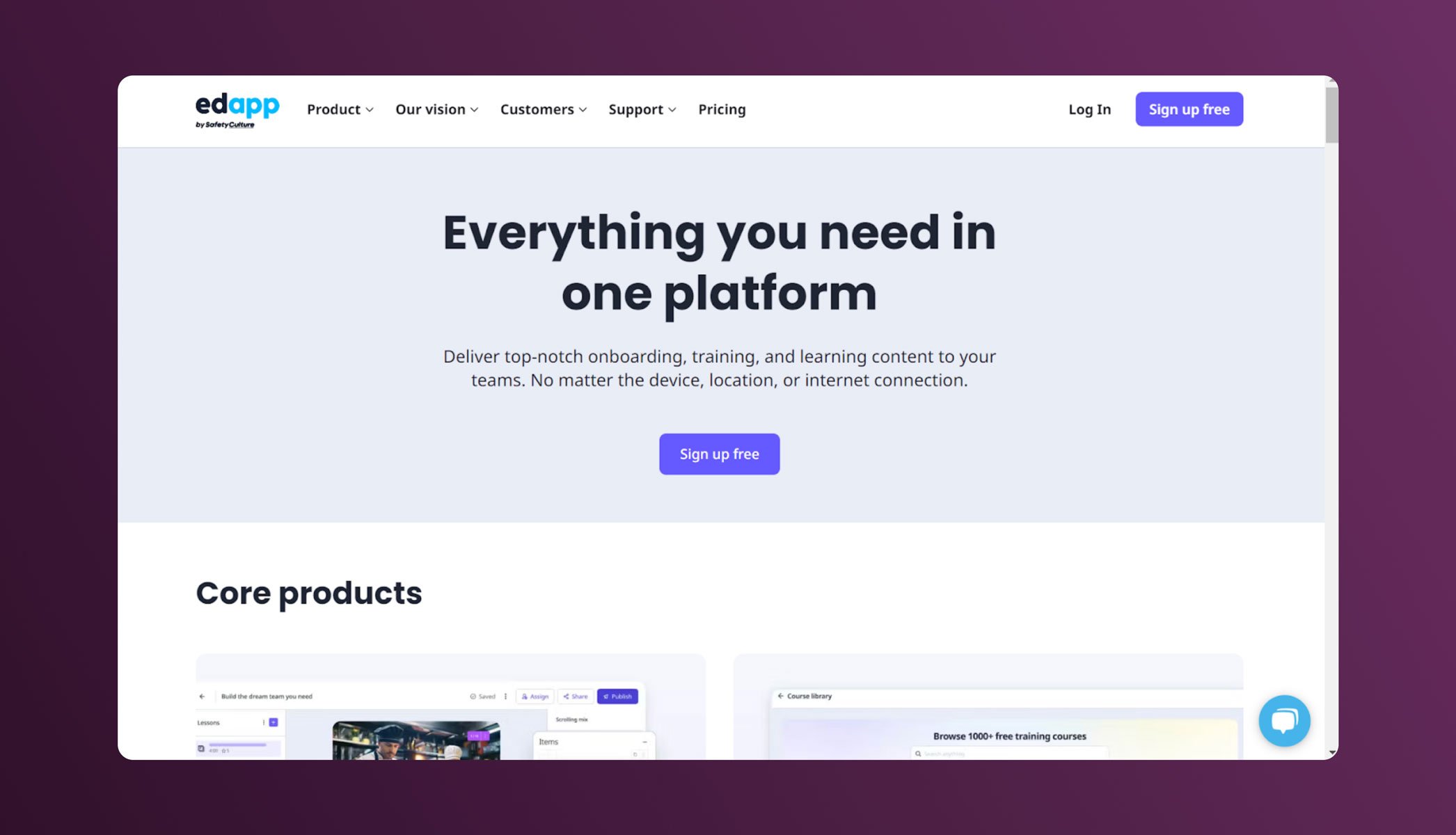
EdApp is a mobile LMS that enables corporate and retail training, making eLearning more effective, efficient, and engaging. It provides administrators the tools to deliver superior onboarding, training, and educational content across any job or location.
Key capabilities of EdApp for hospitality training include:
- Customisable course library: Offers over 1,000 free courses in the library, allowing for customisation to align with your brand and deliver targeted training swiftly.
- Learner portal: Enhances completion rates with microlearning courses through a learner portal, adaptable to any device, facilitating engagement and milestone achievement.
- AI-powered creator tool: Simplifies content creation with AI Create, enabling the building of courses with a few clicks. Features over 80 templates incorporating videos, quizzes, games, and assessments for immediate, high-quality training delivery.
EdApp ratings:
EdApp pricing:
- Freemium version is available.
- Paid subscription plans start from $2.95/user/month.
13. eloomi
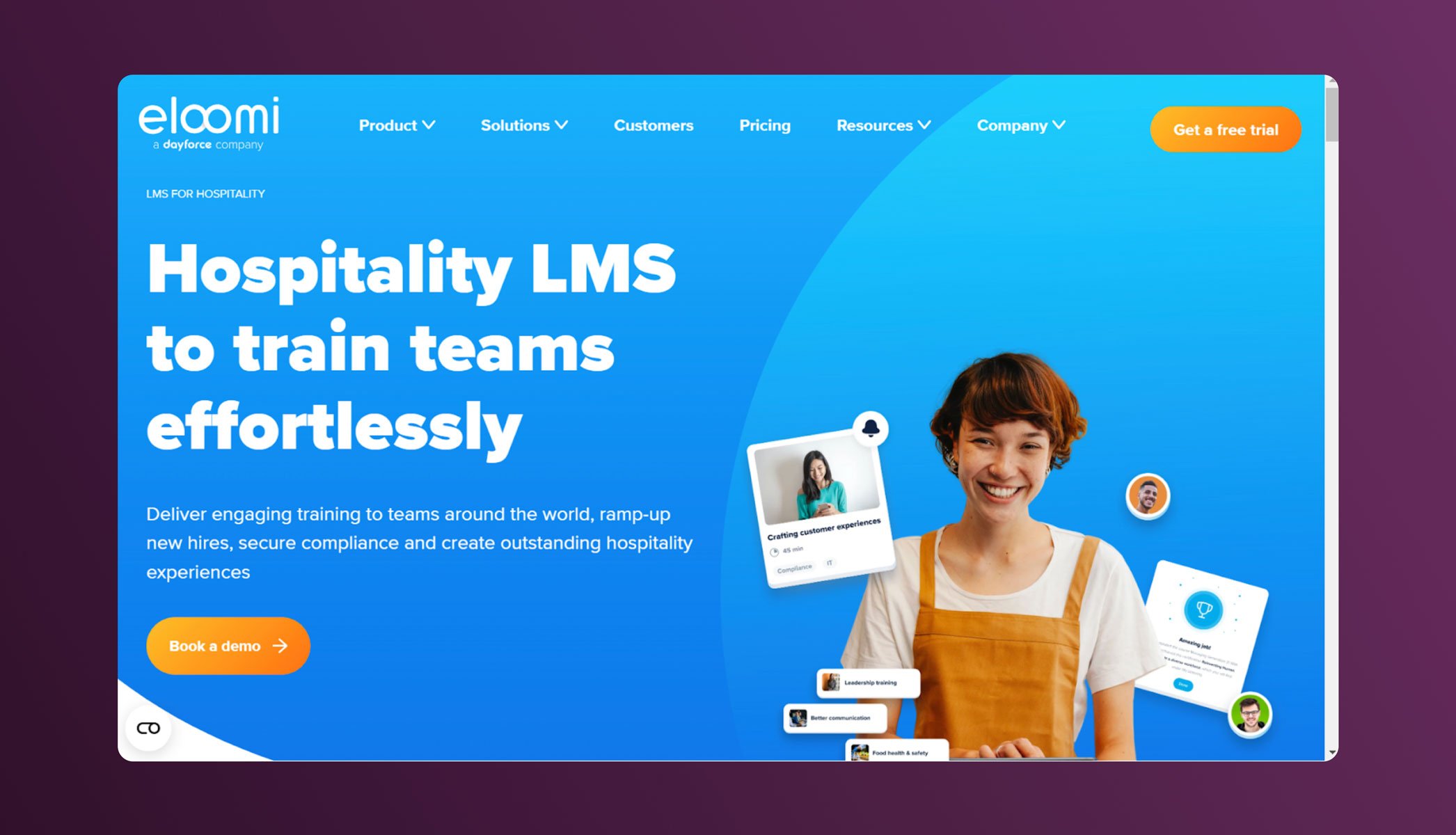
eloomi combines learning and development into a single platform designed to help organisations globally deliver effective training and develop talent, thereby driving business success. As a leader in upskilling and reskilling solutions, eloomi empowers individuals and organisations across various industries, including the hotel industry.
Key capabilities of eloomi for hospitality training include:
- Compliance training simplified: Offers ready-made compliance training from leading providers, ensuring materials are automatically updated and supported by real-time reporting for a hassle-free compliance process.
- Skill mapping: Provides tools to map out organisational skills, identify and close skill gaps with automated training recommendations, and track progress with real-time course completion reports.
eloomi ratings:
eloomi pricing:
- Free trial and paid pricing information is available on request.
14. SkyPrep
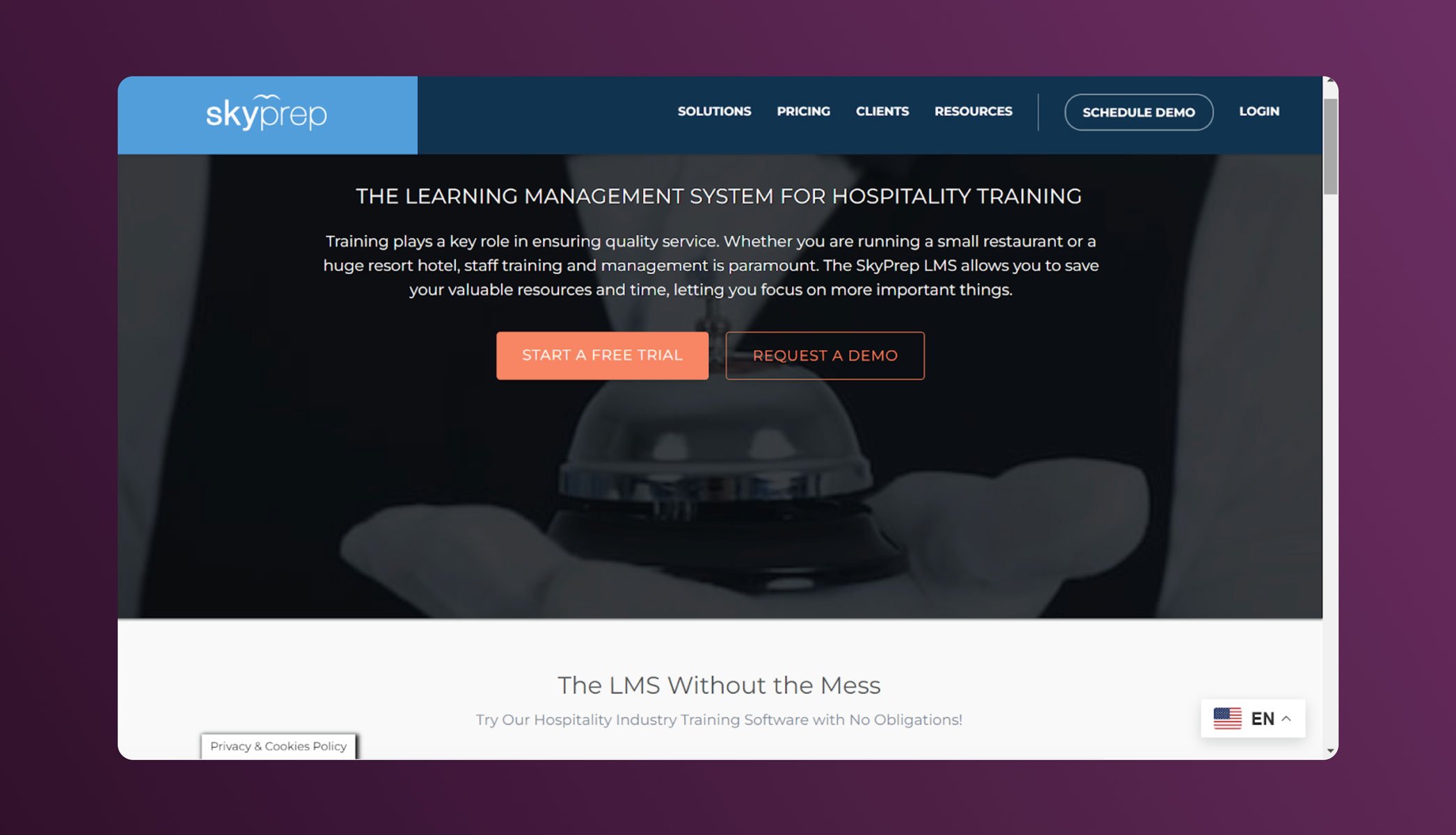
SkyPrep is an online training platform that supports over 500 organisations across various industries in training employees, customers, and partners. Known for its customisable, user-friendly interface, SkyPrep also prides itself on offering exceptional customer support to ensure the smooth delivery of training programs.
Key capabilities of SkyPrep for hospitality training include:
- Auto-enrollments: Streamlines learner enrollment based on user properties like course status, ensuring timely and relevant training assignments.
- Gamification: Enhances learner engagement by setting reward tiers, distributing points and badges, and fostering competition with a user leaderboard.
- Customisable learning environments: Allows for separate branding and content customisation for different audiences through white-labelled platforms, with easy sharing of courses and content.
SkyPrep ratings:
SkyPrep pricing:
- Free trial and paid pricing information are available on request.
15. ProProfs
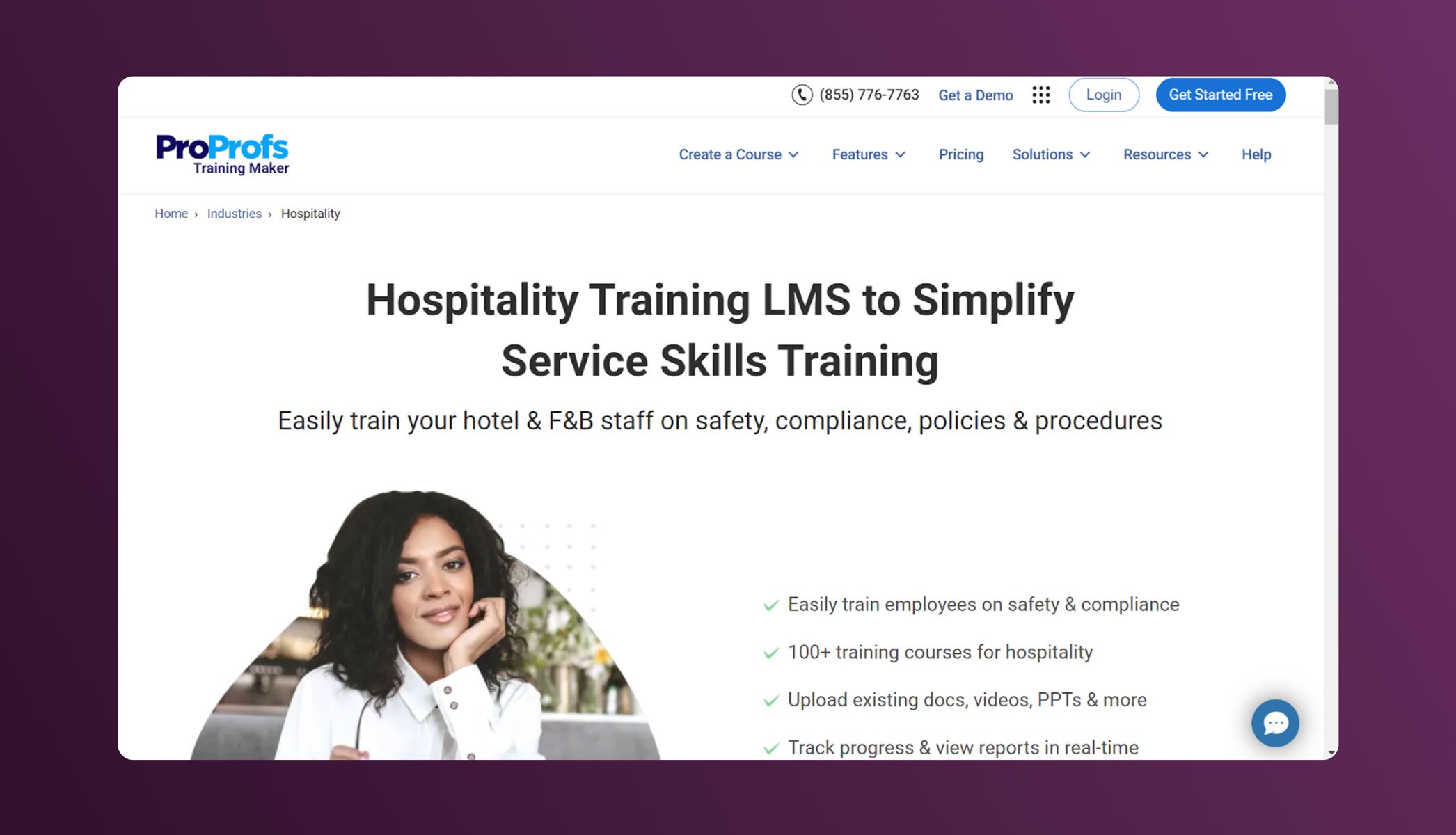
ProProfs is a comprehensive suite of learning tools, including an LMS, designed to facilitate the easy creation, sharing, tracking, and reporting of online courses and assessments.
Key capabilities of ProProfs for hospitality training include:
- Editable course templates: Offers a wide range of online training templates that combine modern design and typography, allowing for the creation of engaging courses that can be personalised with brand logos and images.
- Enhanced security with Single sign-on: Incorporates Single sign-on (SSO) for seamless user authentication, integrating with LDAP and HRIS systems to improve data security while saving time and resources.
- Role-based training assignment: Simplifies the organisation and administration of courses by roles and locations, facilitating targeted training paths for different roles, such as managers and staff within the hospitality and food & beverage industries.
ProProfs ratings:
ProProfs pricing:
- Freemium version is available.
- Paid subscription plans start from $1.97/learner/month.
16. My Learning Hub
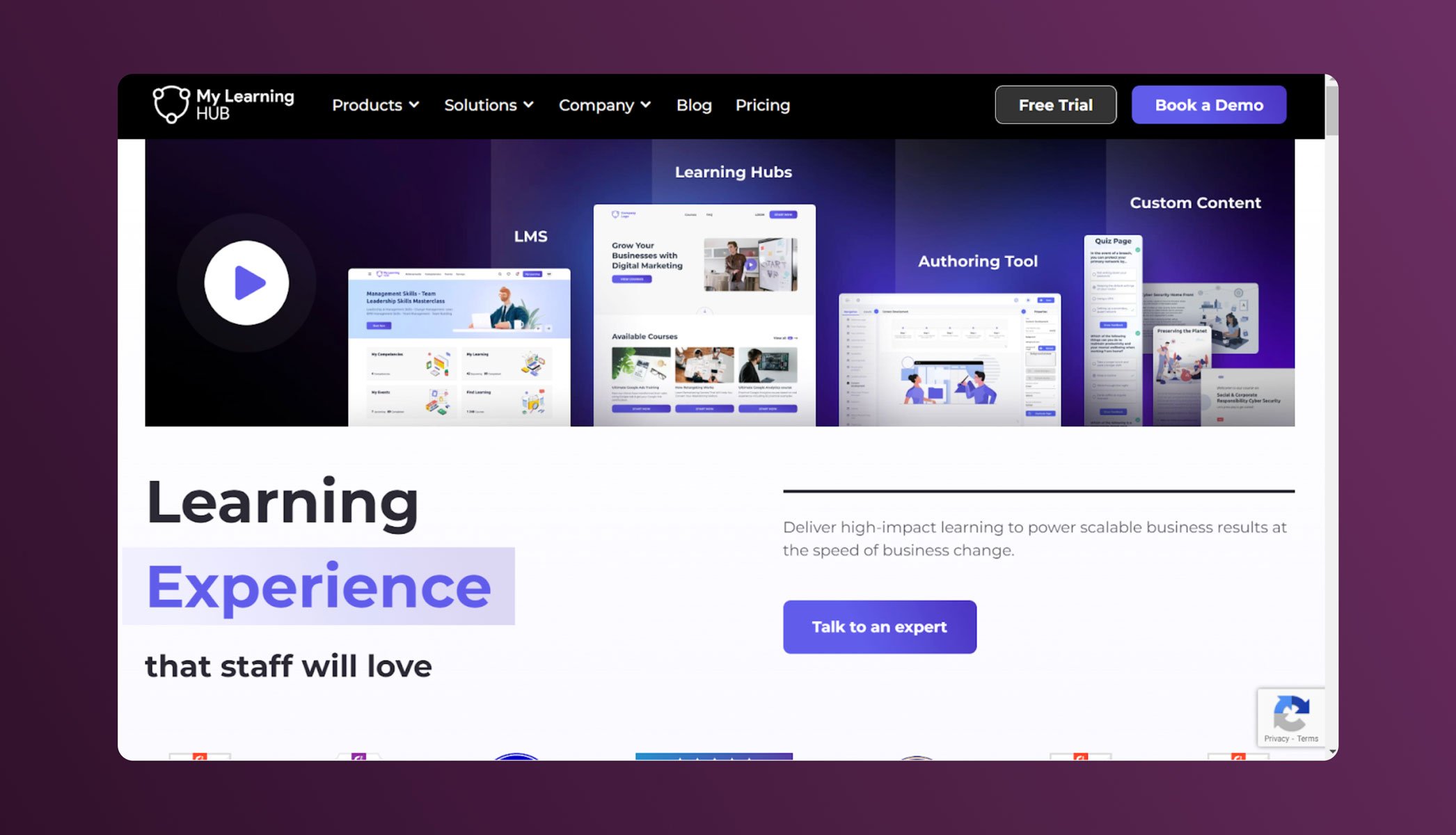
My Learning Hub stands out as an interactive learning platform designed to deliver impactful learning that drives scalable business results amidst rapid changes. This cloud-based suite of tools enables the creation, distribution, tracking, and recommendation of essential knowledge for employees, partners, and customers, fostering growth across the board.
Key capabilities of My Learning Hub for hospitality training include:
- Custom learning paths: Allows for the customisation of course sequences to suit various job roles, offering flexibility in training priority and exploration.
- Integration with Mylo Bot: Facilitates seamless learning within Microsoft Teams or Slack, providing personalised course recommendations and easy access to content based on job roles.
- Comprehensive notifications: This feature keeps learners informed throughout their journey, from onboarding and course launches to progress updates and certificate renewals.
My Learning Hub ratings:
My Learning Hub pricing:
- A free trial is available on request.
- Paid subscription plans start from $8/user/month when billed annually.



















